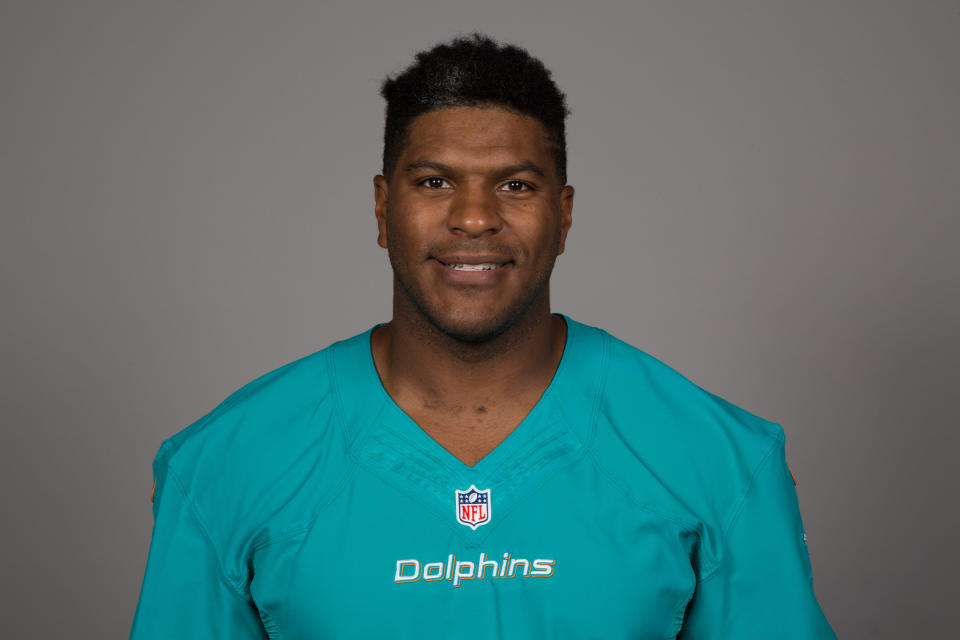Tight end Julius Thomas retiring to pursue doctorate and study brain trauma

Veteran tight end Julius Thomas, the 30-year-old two-time Pro Bowler who spent last season with the Miami Dolphins, has announced that he’s retiring to pursue a doctorate in psychology and study the effects of contact sports on brain trauma.
‘My work as a man was just beginning’
In an introspective piece on The Players’ Tribune, Thomas shares his journey to his decision.
Though he was a basketball player at Division I Portland State and could have played professionally overseas, Thomas wanted to play football. He says that he believed he could do it and felt it could change his life, even though he had little experience with the sport.
Still, he set his sights on getting a workout, and wound up being drafted by the Denver Broncos in the fourth round in 2011.
Thomas burst into NFL consciousness in 2013, when he had 65 catches for 788 yards and a dozen touchdowns; 12 more touchdowns and his second Pro Bowl berth followed a year later. Thomas parlayed the performances into a five-year, $46 million contract with Jacksonville, at the time the biggest contract ever given to a tight end.
But after two seasons, the Jaguars traded Thomas to Miami in February 2017.
Somewhere along the way, Thomas started to take stock of his life.
“I truly loved it. I was happy learning and growing into a veteran,” he writes. “My life and my profession were aligned and meeting my social and personal needs. But more recently I began taking time to check in with myself. By that I mean, taking stock of where I was in life and what was important to me. In those moments of introspection I realized that while I may have reached my financial goals, my work as a man was just beginning.
“I learned that no matter what you have and no matter what other people see, happiness comes from your own definition of it. It became clear that I was living unaware of anything outside of my goal, which was to be the best football player I could be.
“I realized that no matter my material success, I had much work to do internally. I could no longer play to the social ideal of the happy athlete millionaire. I had to take an honest look at who I was, or as Jung would say, dive into my ‘shadow.’ To realize that life is tough emotionally on all of us. That we can’t grow until we have healed from the traumas of our pasts.”
Thomas began reading: the philosophers Socrates and Thomas Aquinas, spiritual teacher Eckhart Tolle, social work educator Dr. Brene Brown, Dr. Martin Luther King and others.
“Although I am and always will be an athlete, there were other parts of me that were being suppressed. Interests, relationships, meaning. I had to learn to accept that my identity was not my profession — actually there were a lot more facets to what makes me, me that I had never fully embraced or explored,” Thomas wrote. “But by doing so I was able to become a fuller version of myself. Through this journey I was able to see the importance of love and compassion and the benefits of peeling back our masks. I became aware of how much others can benefit from this experience as well.”
Going back to school
So Thomas is going back to school, to pursue a doctorate in psychology.
“While making the decision to no longer play the game is difficult, I’m also incredibly excited about what’s next,” he wrote. “Studying therapy and becoming well trained in it so that I can help people heal from their emotional and mental pain.”
He also wants to investigate “the effects of contact sports on brain trauma and neurobehavioral performance” and participate in “research looking at biomarkers that may identify early warning signs of brain disease.”
Thomas came to an appreciation of mental health and mental health practitioners over a course of years; a decade ago, he said, he thought psychology was dumb and psychologists couldn’t tell him anything about who he is.
“I ran from my feelings, like I’m sure most of us do,” he said.
‘That’s what inspired me’
Thomas said he began thinking about how he could best serve others, and realized that he didn’t really have anyone he could call to talk to and who would understand things he was dealing with, like the anxiety of his uncertain future once he stopped playing.
It became clear to him that he could become that person for others.
“And that’s what inspired me to what I’m doing now,” he wrote.
As his interest in psychology grew and he spoke to professionals in the field, Thomas said, CTE came up frequently. He learned about brain trauma research, and that there was research that still needed to be done. And it all fit together for Thomas.
“I believe helping others is what I’m supposed to be doing at this point in my life,” he said. “Hopefully I can help by encouraging more of my peers to connect with who they are outside of the game. If ultimately that’s what I’m remembered for, I’d be very thankful.”


